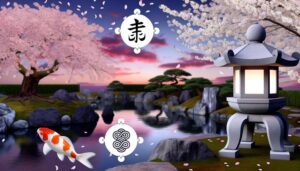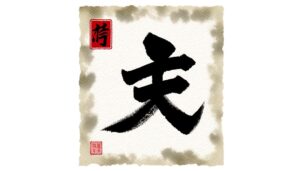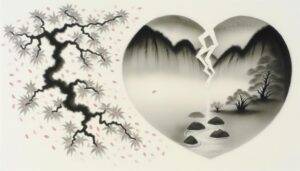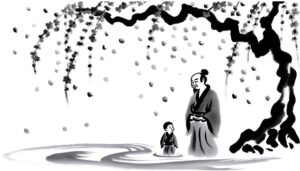Crafting the Japanese Samurai Symbol of Honor
The Japanese symbol for honor, 'Meiyo' (名誉), is deeply ingrained in samurai culture and the Bushido code. This concept embodies integrity, loyalty, and personal righteousness, guiding the ethical and moral behavior of samurai.
Historically, honor held paramount importance in feudal Japan, dictating personal conduct and interactions. In modern Japan, Meiyo continues to influence societal values, professional ethics, and social harmony.
It bridges historical values with contemporary norms, impacting everything from corporate practices to educational systems. To truly understand its continued relevance and intricate role in shaping societal structures, further exploration is essential.
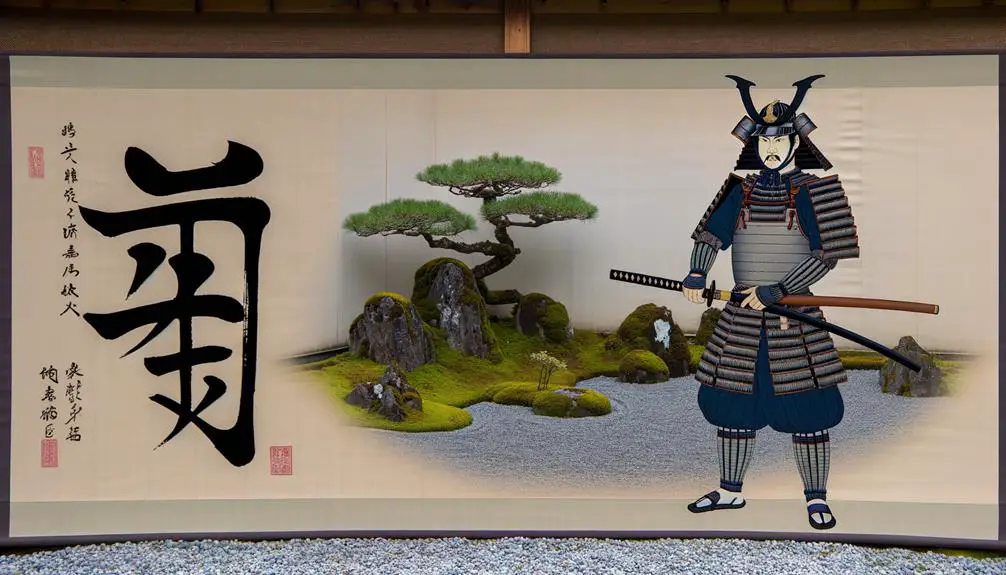
Key Takeaways
- The character for 'Meiyo' (名誉) symbolizes honor in samurai culture.
- 'Meiyo' embodies loyalty, courage, and integrity, core values of Bushido.
- Samurai art, including ink paintings and calligraphy, often features 'Meiyo' to depict honor.
- 'Meiyo' is represented in samurai armor and weaponry through engravings and motifs.
- The concept of 'Meiyo' continues to influence modern Japanese ethics and corporate culture.
The Origins of Meiyo
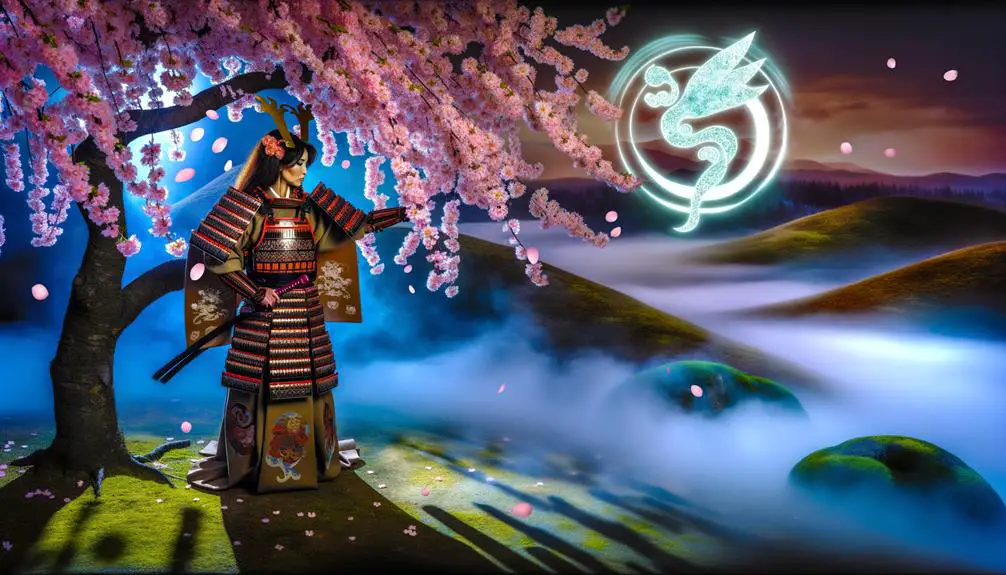
The concept of 'Meiyo,' which translates to 'honor,' has its roots in the ancient samurai code of conduct known as Bushido. Originating in feudal Japan, this ethical system emphasized virtues such as loyalty, courage, and integrity.
Meiyo was not merely an abstract principle but a guiding force that shaped personal and social behavior. It was deeply ingrained in the social fabric, influencing not only the samurai but also the broader Japanese society.
Historical texts and literary works from the period highlight the importance of maintaining one's honor as a reflection of moral character and societal standing. Consequently, Meiyo served as a cornerstone in defining the ethical and moral landscape of Japan, laying a foundation for future generations to uphold these values.
Meiyo in Samurai Culture
In samurai culture, Meiyo, or honor, was deeply intertwined with the Bushido code, dictating behavior and decision-making.
Historically, Meiyo held paramount importance, influencing not only individual samurai but also the societal structure of feudal Japan.
Today, the concept of Meiyo continues to be respected and adapted, reflecting both traditional values and contemporary interpretations.
Historical Significance of Meiyo
Meiyo, the concept of honor, was a fundamental principle that shaped the ethical and social framework of samurai culture. Historically, meiyo influenced the behavior and decisions of samurai, serving as a guiding force in their lives.
This principle dictated not only personal conduct but also the samurai's interactions within their community and loyalty to their lords. Honor was seen as paramount, often taking precedence over life itself; failure to uphold one's honor could lead to severe consequences, including ritual suicide (seppuku).
The historical significance of meiyo extended beyond the battlefield, permeating political, familial, and social spheres. It established a legacy that underscored the samurai's unwavering commitment to a moral code, which profoundly impacted Japanese society and history.
Meiyo and Samurai Code
Embedded deeply within the Bushido code, meiyo represented the core value that defined the samurai's ethical and moral compass. This concept of honor was not merely a personal trait but a societal expectation that governed their actions and decisions. Meiyo compelled the samurai to act with integrity, courage, and loyalty, ensuring their behavior aligned with the highest standards of conduct.
| Bushido Principle | Definition | Role in Samurai Culture |
|---|---|---|
| Meiyo | Honor | Central ethical value |
| Gi | Rectitude | Moral righteousness |
| Yu | Courage | Bravery in adversity |
This table illustrates the pivotal role of meiyo alongside other essential Bushido principles, thereby highlighting its integral position within the samurai's life and duties.
Modern Interpretations of Meiyo
Interpretations of meiyo in contemporary Japanese society reflect both a continuation of traditional values and an adaptation to modern ethical frameworks. In today's Japan, meiyo, or honor, is still highly regarded, often manifesting in professional integrity, personal responsibility, and social harmony.
The concept has evolved to encompass modern ideals such as corporate ethics and civic duty, blending seamlessly with the long-standing cultural emphasis on respect and reputation. While the samurai code is no longer practiced ritualistically, its core principles resonate in modern contexts, including business practices and interpersonal relationships.
Hence, meiyo remains an essential cultural touchstone, bridging historical values with contemporary societal norms, ensuring that the essence of honor continues to shape Japanese life.
Symbolism of Meiyo
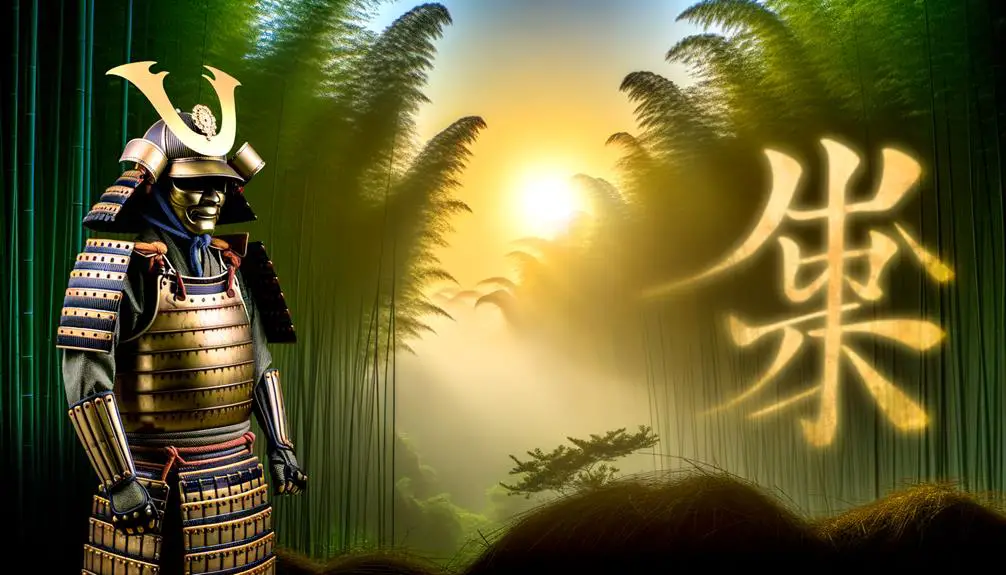
The concept of Meiyo, meaning honor, is integral to the samurai code of Bushido, reflecting the ethical and moral principles that guided the warrior class in feudal Japan. Meiyo symbolizes a samurai's commitment to uphold personal and familial reputation, maintaining integrity and righteousness. It demanded not only martial prowess but also a life of virtue, embodying honesty, loyalty, and respect.
| Aspect | Description | Significance |
|---|---|---|
| Integrity | Consistency in actions and principles | Establishes trust and respect |
| Loyalty | Dedication to lord and family | Secures stability and unity |
| Respect | Honoring others and oneself | Fosters harmonious relationships |
| Righteousness | Adherence to moral and ethical codes | Guides just and honorable conduct |
This multidimensional symbolism underscores the profound influence Meiyo held in shaping samurai identity and societal interactions.
Meiyo in Bushido Code
Meiyo, as a fundamental tenet of the Bushido code, encapsulates the essence of a samurai's ethical and moral obligations. This principle of honor was not merely a superficial attribute but a profound commitment to upholding one's duties with integrity and respect.
The concept of Meiyo permeated every aspect of a samurai's life, guiding actions and decisions.
- Personal Integrity: A samurai's actions had to be in harmony with their inner values and the expectations of their society.
- Reputation: Preserving one's honor was paramount, and any fall from grace could lead to severe consequences.
- Responsibility: The commitment to honor extended to fulfilling obligations to family, clan, and lord, demonstrating unwavering loyalty and duty.
Understanding Meiyo is essential to comprehending the full scope of Bushido.
Historical Examples of Meiyo
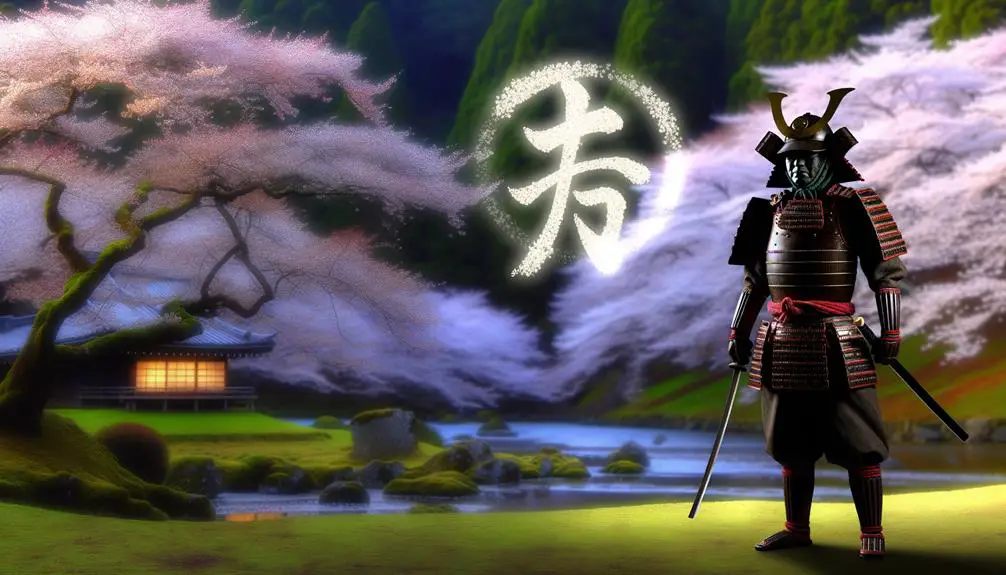
The Samurai Code of Conduct, or Bushido, offers numerous historical examples of meiyo, where valor and honor were paramount. Legendary acts of bravery, such as the loyalty demonstrated by the Forty-seven Ronin and the self-sacrifice of Kusunoki Masashige, exemplify the profound commitment to honor that defined the samurai ethos.
These instances highlight how meiyo was not only an individual pursuit but also a societal expectation ingrained in the fabric of Japanese warrior culture.
Samurai Code of Conduct
Throughout history, samurai adhered to the Bushido code, demonstrating meiyo—honor—in various notable actions and decisions. This code of conduct emphasized virtues such as loyalty, courage, and integrity. Samurai were expected to live and die by these principles, which governed their personal and professional lives.
Examples of meiyo in samurai behavior include:
- Loyalty: Samurai often exhibited unwavering loyalty to their lords, choosing death over betrayal.
- Seppuku: Engaging in ritual suicide to preserve honor when faced with dishonor or failure.
- Justice: Upholding fairness in their judgments and actions, reflecting a commitment to ethical governance.
These historical examples illustrate the profound significance of honor within the samurai code of conduct, shaping their legacy in Japanese culture.
Legendary Acts of Valor
Countless historical accounts illustrate the extraordinary acts of valor performed by samurai, epitomizing the principle of meiyo in their pursuit of honor.
One notable example is the tale of the Forty-Seven Ronin, who avenged their master's unjust death despite knowing it would lead to their own. This act of loyalty and courage has become a cornerstone of samurai lore.
Another example is the Battle of Nagashino in 1575, where Oda Nobunaga's innovative tactics overcame Takeda Katsuyori's formidable forces. Such instances not only demonstrate the tactical brilliance and bravery of the samurai but also their unwavering commitment to honor and loyalty, reinforcing the cultural and ethical significance of meiyo in Japanese history.
Meiyo in Samurai Art
Meiyo, the concept of honor, is intricately woven into the fabric of samurai art, reflecting the deep moral code upheld by these warriors. Samurai art, ranging from ink paintings to intricate armor designs, serves as a visual representation to the values of courage, loyalty, and righteousness. These artistic expressions are not merely decorative but serve as moral reminders and educational tools for both samurais and society.
- Ink Paintings: Depicting scenes of valor and loyalty, these works often illustrate historical battles and legendary samurai.
- Calligraphy: The brushwork often includes the character for 'Meiyo' (名誉), symbolizing the importance of honor in daily life.
- Armor and Weaponry: Elaborate engravings and motifs on swords and armor signify the wearer's commitment to the samurai code.
Such elements collectively underscore the profound respect for Meiyo in samurai culture.
Modern Interpretations of Meiyo
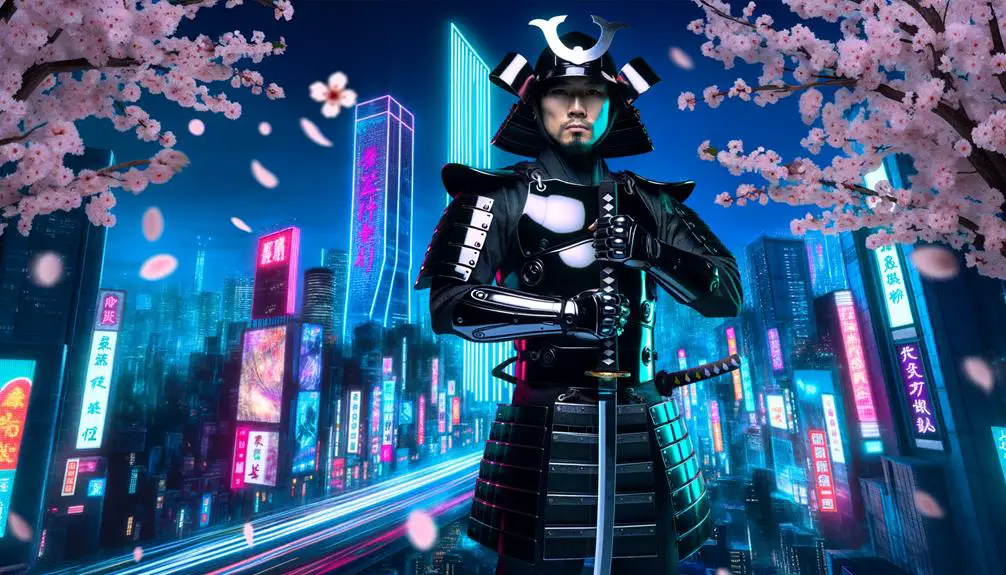
In contemporary times, the concept of Meiyo continues to influence various aspects of Japanese culture, from modern art to corporate ethics. Artists often draw upon the principles of honor in their work, creating pieces that reflect the timeless values of integrity and respect.
In the corporate world, Meiyo manifests as a commitment to ethical business practices and maintaining one's reputation. This historical virtue serves as a guiding principle for leaders and employees, encouraging accountability and excellence.
Educational institutions also emphasize Meiyo, teaching students the importance of honor and moral conduct. While the context has evolved, the essence of Meiyo remains integral to the fabric of modern Japanese society, underscoring its enduring relevance and adaptability.
Meiyo in Contemporary Japan
Rooted in centuries-old tradition, Meiyo continues to play a significant role in shaping the ethical and social frameworks of contemporary Japan. This concept of honor influences various aspects of daily life, from personal interactions to professional conduct.
Modern Japanese society integrates Meiyo through a blend of traditional values and current norms, ensuring its relevance and adaptability.
- Corporate Culture: Many companies emphasize integrity and honor in their mission statements and employee conduct codes.
- Education: Schools instill Meiyo by promoting respect, responsibility, and moral education among students.
- Public Service: Government officials and public servants are often held to high ethical standards, reflecting the enduring importance of honor in public life.
Through these practices, Meiyo remains an integral part of Japanese identity today.
Meiyo's Influence on Global Culture
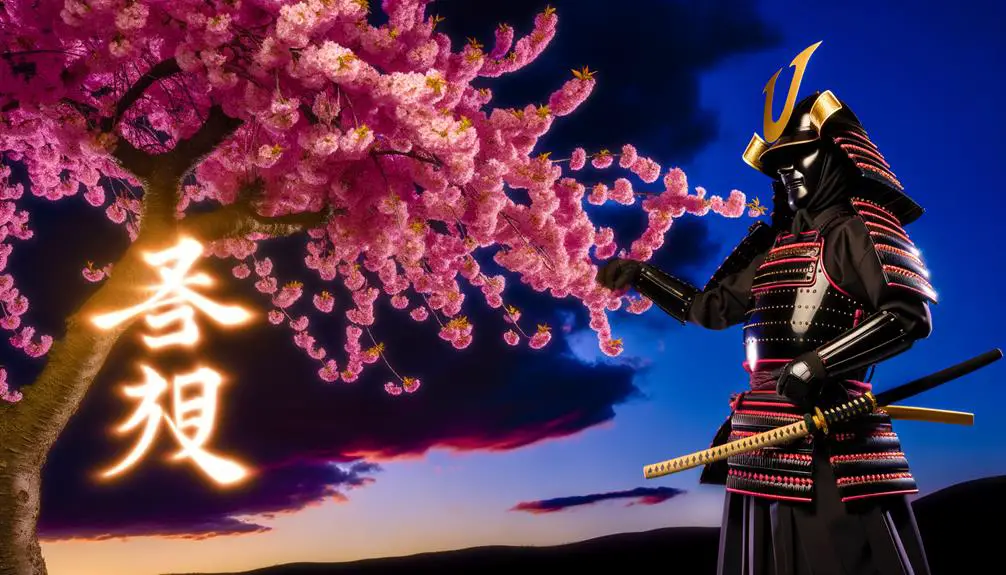
The enduring principles of Meiyo have transcended Japanese borders, influencing global perspectives on honor and ethical conduct. Rooted in the samurai code of Bushido, Meiyo emphasizes integrity, dignity, and personal responsibility. These values have found resonance in various cultures, shaping modern leadership philosophies and corporate ethics.
For instance, in the Western business world, the emphasis on corporate social responsibility and ethical decision-making mirrors Meiyo's focus on honor and accountability. Additionally, Meiyo's principles have permeated educational frameworks, encouraging students worldwide to cultivate personal integrity and responsibility.
This cross-cultural adoption underscores Meiyo's universal relevance, demonstrating that the Japanese concept of honor continues to impact global ethos, fostering a more conscientious and principled world.
Conclusion
Meiyo, the Japanese symbol for honor, manifests as a multifaceted motif throughout history. Integrally intertwined with the samurai's societal standing, meiyo signifies steadfastness, strength, and selflessness.
In the Bushido code, it embodies ethical expectations, while in samurai art, it serves as a visual and spiritual symbol.
Modern interpretations and meiyo's enduring influence in contemporary Japan and global culture underscore its perpetual presence, proving that the principles of honor transcend temporal and geographical boundaries.


